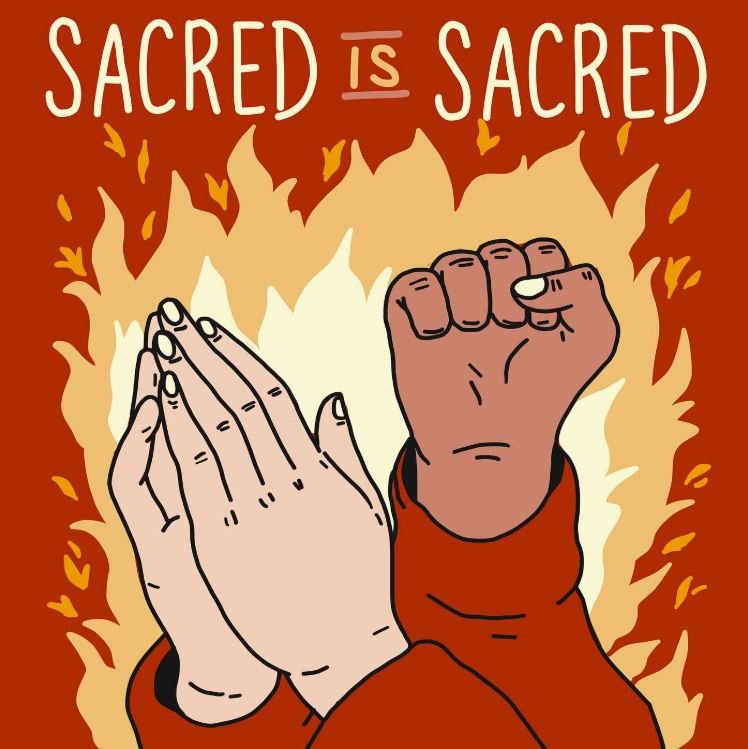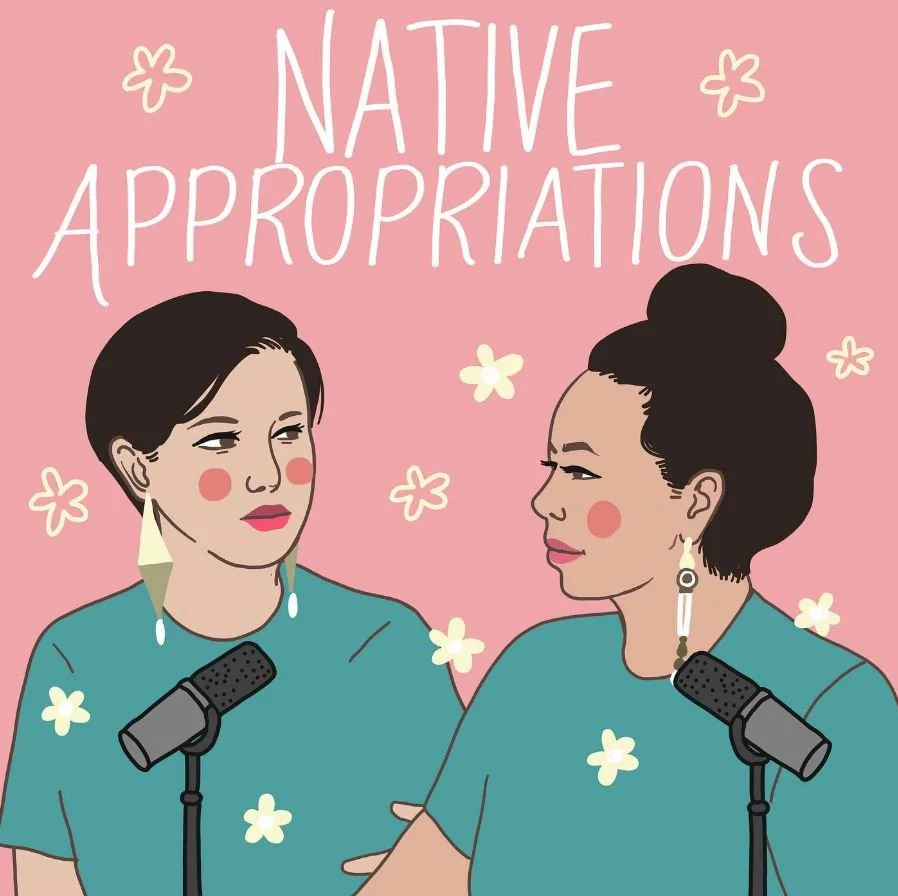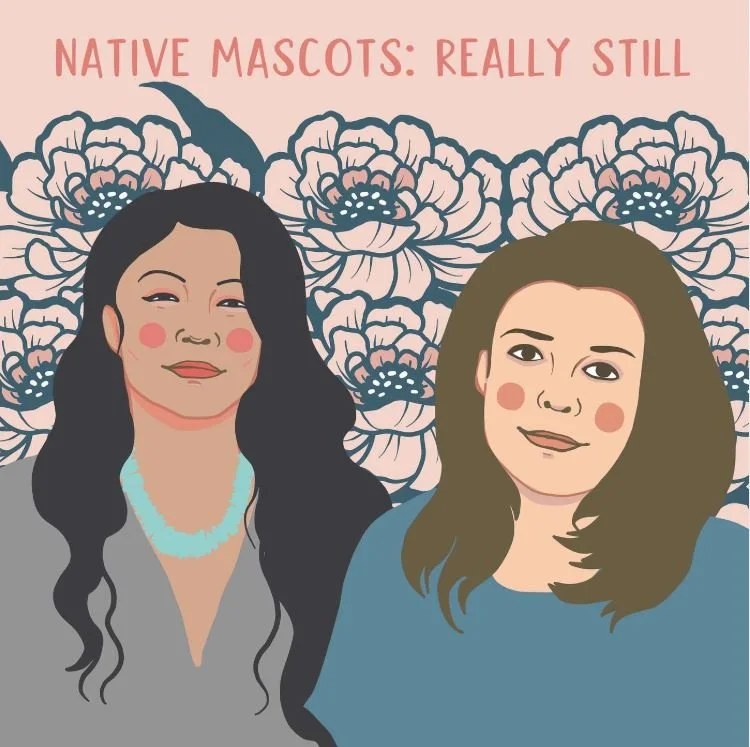
Vote (If You Want To & Can)
Join Matika and Adrienne In conversation with Jami Powell (Osage), Jaclyn Roessel (Diné) and Kristin Dorsey (Chickasaw), for the third and final episode of Indigenous Artist to Artist, Part 3: Who Decides? as we discuss the importance of indigenous people presenting, curating, and exhibiting themselves.

Indigenous Artist To Artist, Part 3: Who Decides?
Join Matika and Adrienne In conversation with Jami Powell (Osage), Jaclyn Roessel (Diné) and Kristin Dorsey (Chickasaw), for the third and final episode of Indigenous Artist to Artist, Part 3: Who Decides? as we discuss the importance of indigenous people presenting, curating, and exhibiting themselves.

Indigenous Artist To Artist, Part 2: We Choose Power
We welcome you into this intimate laughy conversation with three awesome full time artists--Photographer Ryan Redorn (Osage), painter Yatika Star Fields (Cherokee, Creek and Osage) and traditional tattoo artist Holly Nordlum (Inupiaq) for this second episode of Indigenous Artist to Artist as we discuss the importance of indigenous people holding space in the art world, the difference between help and inherent power, while we dare to imagine an otherwise— how beautiful might our world be if Native people were at the helm?

Indigenous Artist to Artist (Part 1): Adapting To Pandemic & Daring to Dream (Copy)
We welcome you into this intimate laughy conversation with three awesome full time artists--Photographer Ryan Redorn (Osage), painter Yatika Star Fields (Cherokee, Creek and Osage) and traditional tattoo artist Holly Nordlum (Inupiaq) for this second episode of Indigenous Artist to Artist as we discuss the importance of indigenous people holding space in the art world, the difference between help and inherent power, while we dare to imagine an otherwise— how beautiful might our world be if Native people were at the helm?

Healing The Land IS Healing Ourselves
Join us for a discussion with community organizer, citizen scientist, activist, water protector, entrepreneur, writer, gardener, and all around incredible Diné woman, Kim Smith. We talk with Kim about her work, aiming to understand how violence on the land is violence on our bodies, and that the inverse can also be true—healing the land is healing ourselves. Kim tells us about her 1200+ mile journey with Nihígaal Bee Lina (Journey For Existence) which walked to all of the sacred mountains of her people. She also discusses her work healing land in her home town of St. Michaels, Arizona and her long-term citizen science project to collect data from Navajo people about the impact of extractive energy plants in their homelands, and so much more.

Whole Family Wellness
Join us for a discussion with Well For Culture founders Thosh Collins (WhaZhaZi, Haudenosaunee and O’otham) and Chelsea Luger (Anishinaabe & Lakota) as we discuss Whole Family Wellness. We cover an indigenous approach to prenatal, baby, postpartum, fatherhood, and a whole family approach to wellness. They study and implement lifestyle teachings of indigenous ancestors, while incorporating new information to contribute to ancient and ongoing chains of knowledge. Indigenous culture has always been dynamic, and wellness is an inherent aspect. Their good words help us to feel grounded amidst this time of pandemic, and we hope you will find comfort in their teachings as well.

Growing New Beginnings
Today we launch Season 2 of All My Relations: “Growing New Beginnings”! This episode was recorded around the new year when the world was functioning without Covid-19, and we were emerging from our off-season hibernation, reveling in new life, and trying to figure out a healthy and wellness-focused way forward. Then, things changed, and we sat on the episode for a bit. We decided to bring the conversation up to speed with the current moment and talk about how we’re riding out the pandemic in our homes, mourning losses and feeling scared, but also continuing to grow.

Bonus Episode: All Our (Socially Distanced) Relations
This bonus episode explores the impacts of Covid-19 in tribal communities. Even though tribal nations are most at risk, Indigenous voices have been widely left out of mainstream news coverage. Nationally, health experts and tribal leaders are sounding the alarm that Native Americans are particularly vulnerable to the spread of Covid-19. During this time of crisis, it is critically important to hear from national leadership.

Love in the Time of Blood Quantum
Hundreds of years ago when colonizers instituted the idea of “blood quantum” as a means of reducing the Native population, our Native ancestors probably did not envision a modern Indigenous world of Tinder, multi-billion dollar tribal enterprises and per cap payments, or a world where who we love might determine if our children are considered Indigenous at all. Last episode we talked about Blood Quantum through history, law, science, and policy. In this episode, we’ll approach the topic on a more personal level--how does it affect our love lives?

Bonus Episode: Celebrate Indigenous People's Day, Not Columbus
The foundational narrative we teach our children about Columbus is rooted in myth and falsity. Instead of teaching our real Native American history, or our real humanity, we’ve settled for American mythology. When we celebrate Columbus, we are blindly supporting indigenous erasure and perpetuating the romantic, dire, insatiable story of extinction. It’s the story that dilutes Native American genocide, and celebrates notions of pioneering, settlement, and manifest destiny. These myths reject indigenous intelligence, indigenous land, indigenous humanity, and dare we say, indigenous futures. So instead, today is a day to Celebrate Indigenous Peoples, and it is an important part of our movement— it centers our stories and therefore our resiliency.

Beyond Blood Quantum
Blood quantum. The percentage of Native “blood” one possesses, the fraction listed on Certificates of Degree of Indian Blood, and a fraught concept that has its defenders and dissenters in our communities. Despite its colonial origins, many tribes still use blood quantum as a requirement for tribal enrollment, and these fictional fractions carry huge weight in the lives of Indigenous Peoples. In this episode we hope to parse out some of these complications around the topic of blood quantum—legally and interpersonally, as well as the ways these metaphors of blood have moved into genetic science.

Can Our Ancestors Hear Us?
On this episode we tackle a huge topic: the importance and power of our Indigenous languages, and the work that's being done to revitalize and promote Native languages. It was too much to fit in with just one guest, so we collected stories from throughout Indian Country, talking to Thelma Whiskers from Southern Ute, Harry Oosahwee from Cherokee Nation, Henrietta Mann from Cheyenne Nation, Amber Heywood and Archie Cantrell from Puyallup, and Tia Averett Pocknett and Sola Santos from Mashpee Wampanoag.

Native Fashion
All My Relations talks story with two of our favorite fashionable friends: artist extraordinaire Jamie Okuma (Lisueño and Shoshone Bannock) and scholar/fashion entrepreneur Dr. Jessica Metcalfe (Turtle Mountain Chippewa). Listen in as we venture into their journeys through the Native fashion world and what it means to them to represent for their communities through fashion and design.

Bonus Episode: Sacred is Sacred!
In light of recent tragedy at Notre Dame, Adrienne and Matika discuss the indigenous response from our communities from a social justice perspective, while also considering our humanity.

Native Appropriations
In this episode, All My Relations explores the topic of cultural appropriation—it’s become such a buzzword, but what is it, really? Adrienne and Matika care deeply about Native representation, and talk constantly about this subject.

Indigiqueer
We join forces with two amazing Indigenous writers and scholars who are making waves in the literary scene with their poetry, prose, and fiction. They weave words and worlds to help us see and understand queer indigenous identities and bodies, the ways that settler colonialism has disrupted and distorted our relationships, and the power of asserting voice in spaces not meant for us.

Decolonizing Sex
Join us for a second discussion with Sisseton Wahpeton Oyate Dr. Kim Tallbear on All My Relations. We'll explore Kim's “life project” of critical polyamory, her journey through feminism, her processes of writing in, with, and for community, and Kim treats us with some of her poetry, the “Critical polyamorist 100s”.

Can a DNA test make me Native American?
Can a DNA test make me Native American? As direct-to-consumer ancestry DNA tests gain popularity and narratives of “discovering” or “proving” Native American ancestry through DNA swirl through the media—what does that mean for Indigenous nations?

Native Mascots: Really, Still?
In 2018 there are still over 2000 schools and professional sports teams with Native mascots, despite decades of activism and academic research demonstrating the harms of these images.

Food Sovereignty: A Growing Movement
Are you truly sovereign if you can’t feed yourselves? Today we delve into a topic we can all relate to! We all got to eat! But how are we eating, or better, WHAT are we eating? And how has colonization disrupted our relationship with our traditional foods?
